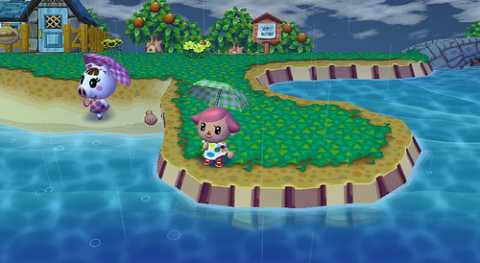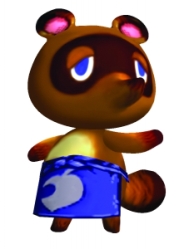
Animal Crossing is a very roundabout sort of game. It opens with you moving to a new village. You'll be the only human in a town full of walking, talking animals, but that never really seems to come up. Along the way you'll make friends with the other residents and run errands for them. You'll also be able to go fishing, catch bugs, dig up fossils, pick fruit or grab shells for money, and spend your income on larger houses, new clothes, more furniture, and other various bric-a-brac. There's no real requirements here, so you can do as much or as little of these things as you like. And there's no real condition for "winning" the game. You simply play until you've gotten your fill.
There's a simple allure to Animal Crossing because there's always something more for you to be doing. You could be working on tracking down a very specific set of furniture, or maybe you're trying to find every one of the game's rare paintings so you can have a completely full museum. Also, the game isn't necessarily time-consuming, either. You could play it for 20-30 minutes a day a few times a week and get a lot out of it. Of course, if you're more obsessive, you can spend a bit more time than that on it. But at that point, you're so focused on raking in money that you're more worried about watering red turnips and planting fruit trees in easy-to-scavenge patterns that you probably wouldn't even have time to read this review in the first place.

That's sort of the problem. Six years later, very little has changed about Animal Crossing. The things I've written so far could apply to any of the games in the series. The Wii game does, however, gain a new city area that you can visit. Here you'll find a few shops, a fortune teller, a barber shop, a place where you can attempt to auction off your extra items, and a theater where you can learn different emote animations. Those emotes only really mean anything when you're playing with other people, though.
Yes, like Wild World before it, City Folk does have an online component. After exchanging game-specific friend codes, one player can open the town gate to allow up to three other players to connect. This makes the animals in your town aware of your friends' town, and inhabitants may swap towns. Each town also has one of a handful of fruit types that are native to that town, so getting some foreign fruit and planting it in your own town is a good way to bring in extra cash. The game has support for (and optionally comes bundled with) the Wii Speak microphone, which is a piece of hardware that sits on top of your TV or shelf or something and mics your entire room so you can freely voice chat with connected players. In my time with it, I found the microphone to sound tinny, with a lot of echo. It probably depends on the shape and size of the rooms being used.

That's why Animal Crossing: City Folk, and your enjoyment of it, comes down to your perspective. If you've never played an Animal Crossing game before, you'll probably love its charm and get lost in all the different tasks you can perform. And if you've stayed away from the series for any serious length of time, you'll probably still be able to enjoy yourself. But the formula hasn't changed, and for a lot of repeat players, it'll probably wear thin quickly.